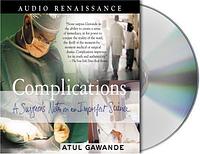You need to sign in or sign up before continuing.
Take a photo of a barcode or cover
520 reviews for:
Complications: A Surgeon's Notes on an Imperfect Science by Atul Gawande
Atul Gawande, Atul Gawande
520 reviews for:
Complications: A Surgeon's Notes on an Imperfect Science by Atul Gawande
Atul Gawande, Atul Gawande
One of those books that sucks you in with its vivid descriptions of the dilemmas, trials and challenges of doctoring and makes you wonder if you should have sucked up the prospect of 5 years of med school to become a doctor.
It did a good job of explaining how providers think, that decisions arise with no clear answer, and that things simply happen with no explanation. But, I found that it drug along often. And I was most painfully bored in the middle, part 2.
I enjoyed reading Gawande's take on medicine, and his exploring of ethical decisions in medicine. It was a great read.
informative
inspiring
reflective
fast-paced
Written while he was still doing 110 hour weeks in residency, and — apparently — raising three kids, Gawande’s first book “Complications” is a painful reminder of how much better the rest of us need to be.
Sparked my interest in pathology - especially autopsies and forensic pathology. In western medicine nowadays it is assumed when people die it's due to complications of X. While it's probably correct and logical to assume that is the case. The gold standard to really understand what happened is to do an autopsy. Could culture in society and potentially funding constraints be hampering our ability to learn from our mistakes?
informative
reflective
medium-paced
“Like the tennis player and the oboist, and the guy who fixes hard drives, we need practice to get good at what we do. There is one difference in medicine, though: it is people we practice upon.”
“That our efforts succeeded at all is sometimes still a shock to me. But they do. Not always, but often enough.”
Complications is such a phenomenal book told by one trusted doctor who is paying attention to an entire industry. Atul Gawande shares his experiences, plus what he gleaned from research and interviews to tell a compelling story. The fact that this was written 20 years ago shocks me. Gawande was ahead of his time. Yet still the system is flawed and fails. One of my favorite parts was about the improvements done with anesthesia processes. I also loved how the incredible stories told in each chapter show the truths of Gawande’s claims. And of course I appreciate the authors writing skill and his respectful treatment of people throughout. Brilliant book all the way around.
Gawande is clear, insightful, and relatable. a very interesting read.
This book pulled me in from the beginning and held my interest to the end. I wish it had been twice as long. The author's style is very simple: introduce an actual case, inform the reader you've changed some names and possibly some small details, set the story up for some drama, step back from the case to provide some general information and return to the case to wrap up the story. And there are lots of interesting cases.
Some of my favorite nonfiction books were written by newspaper reporters and this book has the same feel, where the author knows how to keep the pace moving quickly and moves back and forth between particulars and generalities to create some mystery and tension.
The author's self-effacing style was also pleasing to me.
Some of my favorite nonfiction books were written by newspaper reporters and this book has the same feel, where the author knows how to keep the pace moving quickly and moves back and forth between particulars and generalities to create some mystery and tension.
The author's self-effacing style was also pleasing to me.
A very interesting read about the difficulties diagnosing and treating disease



